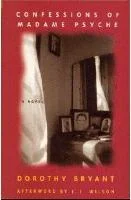Confessions of Madame Psyche
Confessions of Madame Psyche
Dorothy Bryant
Historical fiction, set in turn-of-the-century San Francisco.
Paperback Edition
ISBN: 9781558611863
Publication Date: 05-01-1998
Afterword by J.J. Wilson
This 1987 American Book Award Winner follows the story of the young Mei-li Murrow who is dubbed “Madame Psyche” after she accidentally predicts the San Francisco earthquake of 1906. Although she wins fame and fortune, Mei-li seeks a truer spirituality, and embarks on a pilgrimage that takes her to the death-soaked Europe of the First World War, to a utopian commune in the Santa Cruz Mountains in the 1920s, to the Depression-era migrant work camps and cannery strikes, and finally to the Napa State Hospital, where she finds wisdom and peace among the outcasts of the asylum.
Mei-li’s modern-day epic is grounded in the history of Northern California in the first half of the twentieth century and peopled by comrades of many classes and cultures and by lovers both male and female. Yet her central odyssey remains one of inner discovery.
In Confessions of Madame Psyche, Dorothy Bryant has created a character who is so honest in her search for truth, growth, and spiritual understanding that this quest becomes inherent to her survival.
"Mei-li’s story is breathtaking and heartbreaking. . . . It is in the specifics of time and place that Bryant roots the book’s magic. It is in her characterizations that the magic convinces. . . . Confessions of Madame Psyche describes a life that explores, in ways that only fine fiction can, the differences between myth and illusion, between real psychic gifts and false ones, between fake prophecy and true grace, between righteous hunger for human improvement and limited abilities for its achievement. It does this with consummate ease and without any indication of effort. A beautiful story has, very simply, told itself." —Denver Post
"Confessions of Madame Psyche [is] fascinating and beautiful." —Ursula K. LeGuin, author of The Left Hand of Darkness
"Intricate, appealing [and] profound." —Women’s Review of Books

